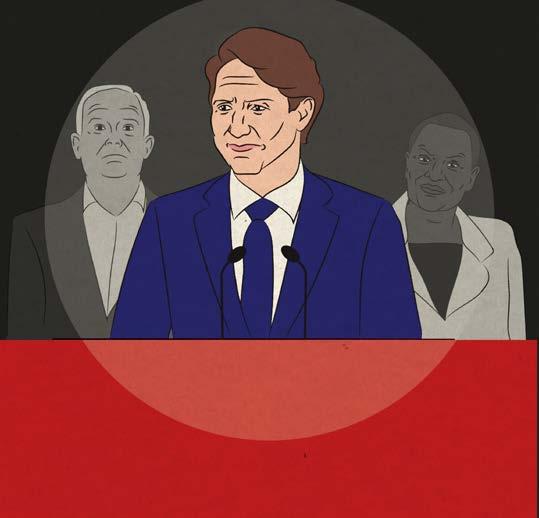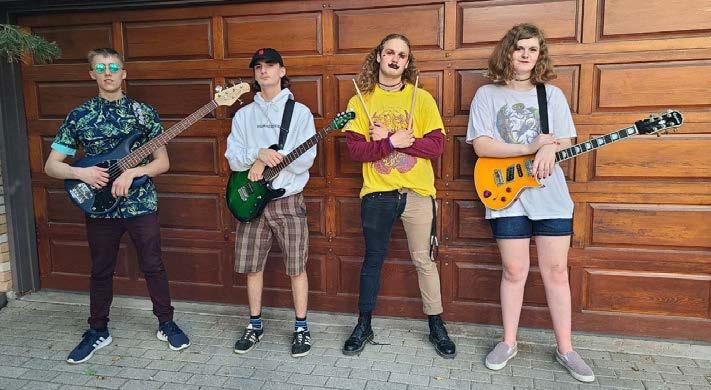
8 minute read
Comment pages 10 and
Trudeau’s gamble sealed O’Toole and Paul’s fates
Despite similar results, new Parliament will bring major changes to power dynamics
COMMENT
Ivan Nuñez Gamez, staff Justin Trudeau has been re-elected for his third consecutive term after a snap election heavily criticized by the public. Trudeau will face an uphill battle in Parliament with yet another minority government very similar to the one he was working with previously. This has left pundits wondering if this was nothing but a $612-million cabinet re-shuffle. In the meantime, Erin O’Toole and Annamie Paul’s futures as leaders are on the tightrope after disappointing election results caused their caucuses to lose key seats.
Despite the fact that early polls heavily favoured the Liberal party, the party’s campaign trail quickly became a battleground with the Conservative party, which gained support rapidly. What was a comfortable lead quickly became a tight race after Trudeau failed to explain why the election was called. Instead, Trudeau filled the gaps with wedge issues on matters all major parties supported, and these attempts at distraction turned the election into nothing more than a re-run of 2019. Nonetheless, Trudeau described these results as a “clear mandate” from Canadians to continue working on a post-pandemic response.
Trudeau might not be going anywhere anytime soon, but the election results reflect the discontent of Canadians following the snap election. The Liberals were not the only party that fell short of achieving its electoral goals — in fact, no party got what they wanted.
Leader of the New Democratic Party (NDP) Jagmeet Singh aimed to form the first NDP federal government, but only increased his seat count by one member of Parliament. Further, Bloc Québécois leader Yves-François Blanchet fell short of his 40-seat goal. Despite such low improvement that resulted from expensive campaigning, senior party officials and supporters from their respective parties are expected to continue supporting Singh and Blanchet for at least another two years. On the other hand, O’Toole and Paul might not be facing the same fate.
O’Toole and his centrist campaign were able to win the popular vote for the Conservative party but unable to translate that support into parliamentary seats. Despite doing considerably well in Atlantic Canada, Conservative support fell by roughly 14 per cent in Alberta — a Conservative stronghold. This was likely due to the lack of a coherent pandemic response from the current United Conservative Party Premier Jason Kenney.
Conservatives were also affected by the rise in support for the People’s Party of Canada (PPC), whose “social-conservative” proposals against pandemic mandates and pro-conversion therapy stance tilted certain voters to the far right. Despite not winning any seats in the House of Commons, the PPC vote split played a tie-breaking role that allowed the Liberals to win certain ridings. O’Toole faces an uncertain future as members of the Conservative party are calling for a leadership review.
O’Toole has argued the review will allow the party to evaluate its flaws after decreasing its seat count by two MPs. However, one question for the Conservatives remains: was moving to the centre the right path?
On the other hand, Paul — whose campaign was filled with controversy from the start — ended up fourth in her Toronto Centre riding. The Green party, which was blooming under Elizabeth May’s leadership, regressed to only two MPs. Prior to the election, Paul hinted she did not want to remain as party leader even if elected and said she campaigned locally to avoid influencing certain ridings like Fredericton, N.B., whose Green MP crossed the aisle to become a Liberal earlier this year. After a disastrous outcome, many have questioned the relevance of the Green party, whose brand primarily focuses on the climate emergency which has been recognized by all the main parties.
As the newly elected parliamentarians head back to Ottawa, the Liberals have a long list of campaign promises to fulfill and they can’t do it without support from opposition parties. Trudeau, who branded his party as the only viable progressive option, will have to schmooze with the NDP or Bloc Québécois to turn his promises into action.
Singh promised in his concession speech to continue pushing for the expansion of health care to include dental services, the creation of universal pharmacare, an end to for-profit long-term care and viable solutions for the housing crisis. The NDP has also vowed to continue fighting to provide Indigenous communities like
Neskantaga with clean water — a promise Trudeau failed to keep after his victory in 2015.
While Blanchet and the
Bloc Québécois have said they’ll support anything that benefits Quebec, they have tended to support progressive policies that emphasize taxing high-income earners and support environmental protection.
This means we can expect the Liberals to swing more to the left in this Parliament.
On the other hand, O’Toole said he will fight for unity and will be putting Canada first while leading his caucus. He also emphasized rebranding the Conservative party. However, the Conservative party is facing an uphill battle with the uncertain future of its centrist leader and lack of allies inside Parliament to make significant contributions.
With big promises to keep on the housing crisis, reconciliation, the climate emergency and a post-pandemic recovery, parliamentarians should be more than busy. The policy determined in this Parliament will be a threshold moment in history.
Was moving to the centre the right path?
graphic / Dallin Chicoine /
staff comment@themanitoban.com
Winnipeg band mixes styles in upcoming EP
Local quartet on mathcore, politics and producing an EP during COVID-19

ARTS & CULTURE
Zoë LeBrun, staff
Since the early days of the internet, the web has been the birthplace of great bands and musicians. One of the latest is hopscotchbattlescars, a local fourpiece mathcore band that isn’t afraid to mix politics and humour in heavy tunes. The Manitoban sat down with the members of hopscotchbattlescars to discuss their origins as well as their debut EP and upcoming show.
In September 2020, just before Manitoba’s second wave of COVID-19 sent the city into quarantine, hopscotchbattlescars began with just two members — Wyatt King on drums and co-lead vocals and Simone on guitar and co-lead vocals.
Despite being stuck in lockdown, King and Simone didn’t let distance keep them from writing and recording music. Similar to bands creating music in DIY scenes in the early 2000s who used the internet to share their music, hopscotchbattlescars used new social media platforms such as TikTok, Instagram and YouTube to write music and further their reach.
“We developed the project by writing, recording and releasing songs from our respective homes, sending audio files and voice memos back and forth in order to put songs together,” King said.
“The process of writing over Facebook Messenger is strange. It’s kind of like each of us have half of a different puzzle and we are forcing them together into one.”
The band released three singles this way and recruited two new members in 2021: Jude Zeglinski on guitar and Erik Stokes on bass guitar and backing vocals.
With musical influences such as SeeYouSpaceCowboy, Kaonashi, the Callous Daoboys, MouthBreather, Protest the Hero and Ed Gein, the band’s music is fueled by an eclectic set of interests and is best described by the metal subgenre mathcore.
“Mathcore is a genre that blends elements and sounds of hardcore and metalcore with the mindset of free jazz,” King explained.
What this leaves listeners with is a heavy sound that incorporates a variety of vocal, drum and guitar styles from many genres. Mathcore is also inherently juxtapositional and is often characterized by contrasting sections of technical precision and chaos, which hopscotchbattlescars layers into their music with skill.
“We each are pulling from such a vast pool of influences,” King said.
“I don’t always want the changes between sections to be logical. I love the jarring nature of starting a song with an intense black metal-esque blast beat with shrieking vocals and wailing tremolo guitars and then immediately switching into a disco beat with sass vocals and syncopated panic chords.”
Another impact on the band’s sound has been their experience as an “internet band.”
“We are honestly all too young to have any real nostalgia for [the] Myspace age, but we all have a lot of love for those bands,” King said. “We are also really into this new crop of bands that are bringing back these ‘Myspace sounds’ […] because of how they are working these flavours into more modern styles of mathcore and noise.”
The band employs juxtaposition in terms of lyrical content as well. Although they are an explicitly political band, they often use humour as a way to get their message across.
“In our lyrics we are often covering heavy topics such as homophobia, transphobia, bigotry, corruption, climate issues, class issues [and] race
— Wyatt King, drums and vocals
issues,” King said.
“For me, it’s about striking that balance, where I am talking about serious subject matter, but adding in some silly stuff so it isn’t just full-out depressing.”
The band is set to release its debut EP first name hopscotch, last name battlescars on Oct. 15. The EP consists of four brand-new tracks which discuss broad topics such as cancel culture, commercial fishing and anonymous hate, to name just a few.
The day following the EP release, Oct. 16, hopscotchbattlescars will be playing a show at Bulldog Pizza alongside other emerging local musicians GLADLY, Lowlife, Poodle Paddle and SLEECH.
“It’s not for people who are genre-elitist or close-minded,” King said.
“It’s just kind of a showcase of what Winnipeg has been doing in the last two years.”






